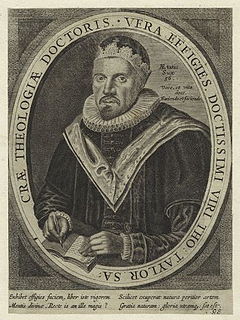Life
Born about 1596, Jemmat was from a prosperous family of Reading, Berkshire. His mother Elizabeth Grove was buried, at the age of 81, in the churchyard of St Giles' Church, Reading, on 22 March 1650, was described in the parish register as the "pious mother of three Jemmats, vicars of the parish successively". [1]
Educated at Reading grammar school, Jemmat went to Magdalen College, Oxford in 1610, and graduated B.A. there on 23 May 1614. Before he took his M.A., 25 February 1617, he moved to Magdalen Hall, and shortly afterwards was ordained priest (15 June). [1] [2]
Jemmat then spent a period in Reading, and married. While there he may have acted as an assistant to Thomas Taylor. He moved to Lechlade in Gloucestershire, where he described himself as preacher of God's word (1624). [1] About 1626 he became a licensed lecturer at Isleworth, Middlesex, confirmed by William Laud in 1632. [3]
By appointment of the House of Commons, Jemmat in 1642–3 was lecturer at Dunstable and Kingston upon Thames, and in the neighbourhood of Faversham. [1] He became rector of Nettlestead, Kent, in 1643, a living he held to 1647, then returning to Isleworth as preacher. [2] [3]
Jemmat became vicar of St Giles's, Reading, by grant of the House of Lords under the great seal, 20 December 1648; the former vicar, Jemmat's elder brother John, had been buried in the church on 10 December 1648. At the English Restoration of 1660 Jemmat conformed, and retained his benefice for the rest of his life. He died at Reading on 28 Jan 1678, and was buried in the chancel of St Giles's Church on 31 January. [1]
Works
Jemmat published: [1]
- A Spiritual Trumpet exciting and preparing to the Christian Warfare, sounded first in the utmost parts of the Lord's Camp to one Wing of the Army, now in the midst for the benefit of all. By Wm. Jemmat, M.A., preacher of God's Word at Lechlade in Gloucestershire, London, 1624.
- A Watchword for Kent, exhorting God's People to stir themselves up out of Security, London, 1643.
- The Rock, or a settled Heart in unsettled Times … being the Heads of some Sermons preached lately by William Jemmat, pastor of Nettlestead, co. Kent, London, 1644.
- A Practical Exposition of the Historical Prophecy of Jonah, London, 1666.
- Now and Ever, London, 1666.
His individual sermons were published in 1623, 1624, 1627, 1628, 1643, and 1644. He also edited works of Thomas Taylor 1576–1633, beginning with A Mappe of Rome (five sermons, 1620). He abridged John Preston's works (An Abridgement of Dr Preston's Works 1648); and edited Paul Baynes's Commentary upon the whole Epistle of Paul to the Ephesians, London, 1656. According to Anthony Wood, he also translated works of Thomas Goodwin into Latin. [1]

Edmund Calamy was an English Presbyterian church leader and divine. Known as "the elder", he was the first of four generations of nonconformist ministers bearing the same name.

George Gillespie was a Scottish theologian.
John Saltmarsh was an English religious radical, "One of the most gentle tongued of controversialists", writer and preacher. He supported the Covenant and was chaplain in Thomas Fairfax's army. The Dictionary of National Biography describes his theology as "Calvinistic in its base, but improved by practical knowledge of men" William Haller called him that strange genius, part poet and part whirling dervish. He preached Free Grace theology, and published on the topics of Peace, Love and Unity.
Francis Cheynell (1608–1665) was a prominent English religious controversialist, of Presbyterian views, and President of St John's College, Oxford 1648 to 1650, imposed by the Parliamentary regime.
Lazarus Seaman, was an English clergyman, supporter in the Westminster Assembly of the Presbyterian party, intruded Master of Peterhouse, Cambridge, and nonconformist minister.
Robert Harris (1581–1658) was an English clergyman, known as a Puritan preacher, member of the Westminster Assembly, and President of Trinity College, Oxford.

(Thomas Case was also an Oxford professor of philosophy.)
Daniel Cawdry (Cawdrey) (1588–1664) was an English clergyman, member of the Westminster Assembly, and ejected minister of 1662.

Obadiah Sedgwick (1600?–1658) was an English clergyman of presbyterian views, and a member of the Westminster Assembly.
William Sedgwick was an English priest of Puritan views and mystical tendencies, known as the “apostle of the Isle of Ely” and “Doomsday Sedgwick”.

John Warner was an English churchman, Bishop of Rochester and royalist.

Thomas Taylor (1576–1632) was an English cleric. A Calvinist, he held strong anti-Catholic views, and his career in the church had a long hiatus. He also attacked separatists, and wrote copiously, with the help of sympathetic patrons. He created a group of like-minded followers.
Obadiah Grew was an English nonconformist minister.

William Greenhill (1591–1671) was an English nonconformist clergyman, independent minister, and member of the Westminster Assembly.

Henry Scudder was an English minister of presbyterian views, known as a devotional writer, and member of the Westminster Assembly.
Nathaniel Hardy (1618–1670) was an English churchman, Dean of Rochester from 1660.
Henry Wilkinson (1616–1690) was an English clergyman and academic, Principal of Magdalen Hall, Oxford and White's Professor of Moral Philosophy, and later an ejected minister.

George Hughes (1603–1667) was an English Puritan priest and writer.
John Reading (1588–1667) was an English priest of Calvinist views and Biblical commentator.
Christopher Fowler (1610–1678) was an English ejected minister.
This page is based on this
Wikipedia article Text is available under the
CC BY-SA 4.0 license; additional terms may apply.
Images, videos and audio are available under their respective licenses.
![]() This article incorporates text from a publication now in the public domain : Lee, Sidney, ed. (1892). "Jemmat, William". Dictionary of National Biography . Vol. 29. London: Smith, Elder & Co.
This article incorporates text from a publication now in the public domain : Lee, Sidney, ed. (1892). "Jemmat, William". Dictionary of National Biography . Vol. 29. London: Smith, Elder & Co.







